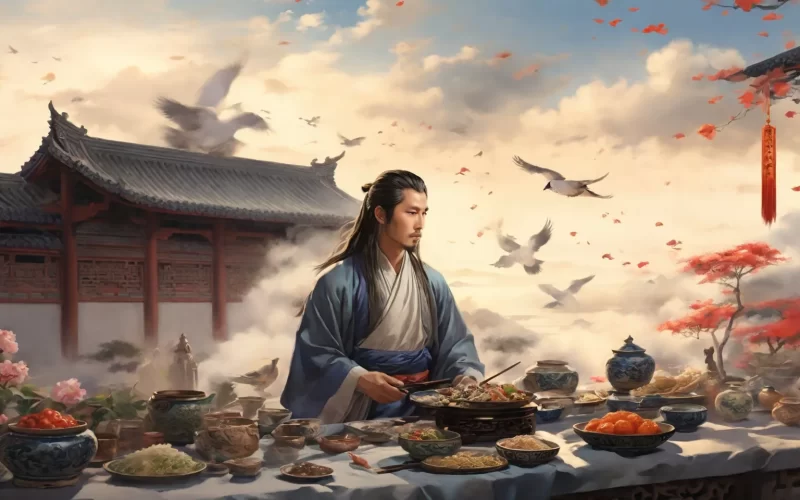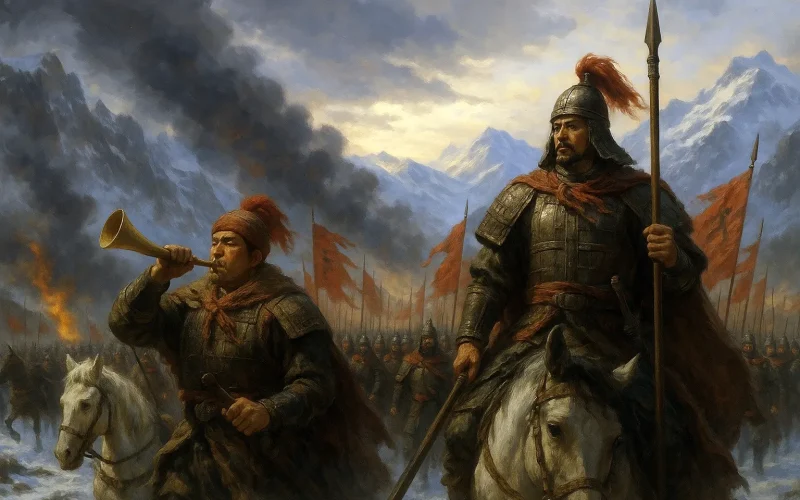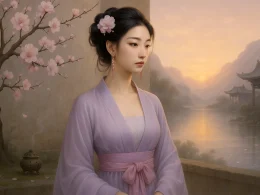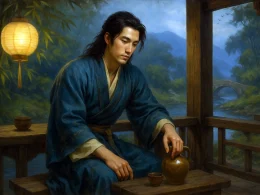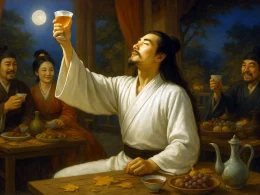Together we officials climbed vermilion steps,
To be parted by the purple walls...
Our procession, which entered the palace at dawn,
Leaves fragrant now at dusk with imperial incense.
...Grey heads may grieve for a fallen flower,
Or blue clouds envy a lilting bird;
But this reign is of heaven, nothing goes wrong,
There have been almost no petitions.
Original Poem:
「寄左省杜拾遗」
岑参
联步趋丹陛, 分曹限紫微。
晓随天仗入, 暮惹御香归。
白发悲花落, 青云羡鸟飞。
圣朝无阙事, 自觉谏书稀。
Interpretation:
In the second year of the Zhide reign (757) during the reign of Emperor Suzong of the Tang Dynasty, Cen Can (岑参) was appointed Right Remonstrator (右补阙) upon Du Fu’s recommendation, a position responsible for advising the emperor and offering remonstrance. At the time, Du Fu served as Left Remonstrator (左拾遗), under the Secretariat, while Cen Can’s position was under the Chancellery. Both were officials tasked with giving counsel, and they were also close friends. This poem is a poetic exchange between Cen Can and Du Fu. While it seemingly describes the scene of attending court together, it actually expresses the poet’s deep disillusionment with the tediousness of court life and the hypocrisy of officialdom. Using evocative imagery and refined language, the poem conceals the poet’s inner frustration and disappointment, vividly portraying the awkward position of remonstrators—an office with little real influence. It also subtly conveys the poet’s helplessness and resentment toward the emperor’s refusal to heed advice.
First Couple: “联步趋丹陛,分曹限紫微。”
Stepping in unison, we ascend the crimson palace steps, each standing in position according to our rank before the Purple Palace.
The opening lines depict the morning court ritual, where officials walk in unison and take their designated places in front of the imperial palace. On the surface, this conveys order and grandeur, but it subtly hints at the insignificance of remonstrators, whose scattered positions make it difficult for them to exert real influence. The ornate language masks a hidden dissatisfaction.
Second Couple: “晓随天仗入,暮惹御香归。”
At dawn, we follow the imperial procession into the court; by dusk, we return, imbued with the lingering fragrance of the palace.
These lines continue to illustrate the daily life of remonstrators, who accompany the emperor in and out of the court. Though this appears to be an honor, it actually underscores their powerlessness. They remain near the emperor, yet their role is largely ceremonial. The phrase “imbued with the fragrance of the palace” subtly alludes to the emptiness and superficiality of court life, implying a hidden critique.
Third Couple: “白发悲花落,青云羡鸟飞。”
My white hair grows as I grieve for the fallen blossoms; I envy the birds soaring freely into the blue sky.
Here, the tone shifts to personal lamentation. The poet, aging and unfulfilled, mourns wasted years in the palace, where ambitions wither like falling petals. The contrast between fallen flowers and soaring birds reflects his deep yearning for freedom and his sorrow over being trapped in the confines of officialdom. This marks a turning point where his suppressed frustration becomes more evident.
Fourth Couple: “圣朝无阙事,自觉谏书稀。”
In this illustrious reign, there are no flaws to be corrected, so naturally, remonstrances are rare.
On the surface, these lines seem to praise the emperor’s governance, but they are, in fact, laced with irony. If there were truly no issues, then remonstrators like Cen Can and Du Fu would be redundant. The phrase “remonstrances are rare” subtly criticizes the emperor’s unwillingness to accept advice, highlighting the poet’s frustration with his own futile position.
Core Summary:
The poem employs ornate diction to depict the court’s morning rituals, seemingly celebrating a prosperous era. However, beneath the polished surface, the carefully balanced couplets reveal the poet’s deep frustration—his discontent with the empty role of remonstrators, his weariness of the superficiality of court life, and his resentment toward an emperor who refuses to heed honest counsel. Drawing from personal experience, the poet conveys both the honor and the futility of his position, creating a powerful contrast between prestige and helplessness.
Overall Appreciation:
"Following Minister Du’s Departure from Tanzhou" is a quintessential palace-themed poetic exchange. On the surface, it appears to extol a flourishing reign, yet it harbors profound melancholy. The poet crafts an image of palace grandeur while subtly exposing the mundane reality of remonstrators—merely existing in the emperor’s shadow, unable to influence policy. The poem transitions from the splendor of court life to the poet’s own loneliness, from lamenting fallen flowers to subtly mocking the “flawless” reign. Each layer deepens the emotions, creating a gradual and poignant revelation. Despite holding an official title, Cen Can finds himself voiceless and powerless—a contradiction that forms the poem’s emotional core. Though the language remains refined and dignified, an undercurrent of resentment and disappointment is unmistakable, making this poem one of the rare instances in Tang palace poetry where political disillusionment is so artfully veiled.
Literary Features:
- Contrast between Appearance and Reality: The poet juxtaposes the grandeur of palace life with his inner sorrow, using elegant language to mask deep frustration, creating a layered contrast.
- Meticulous Parallelism and Structure: Every couplet adheres to strict tonal and syntactic balance, showcasing Cen Can’s mastery of regulated verse and the formal elegance required in palace poetry.
- Subtle Irony and Satirical Undertones: The poem’s apparent praise of the emperor is, in fact, a veiled critique. By employing irony, the poet discreetly conveys his dissatisfaction with the political climate.
- Gradual Emotional Progression: The poem shifts from an external description of palace rituals to an internal reflection on personal frustration, unfolding in a logical and deeply expressive manner.
Insights:
This poem vividly portrays the predicament of remonstrators during the Tang Dynasty, reminding us that in times of ostensible prosperity, genuine critique is often unwelcome. Cen Can, through his skillful use of implicit satire, conveys his sense of powerlessness and disappointment. His refined yet melancholic tone reflects how intellectuals in restrictive political climates often resorted to subtle, indirect criticism as a survival strategy. Beyond its historical context, the poem prompts reflection on a broader theme: In a truly thriving era, should there not be space for honest discourse rather than mere embellishment of an illusion? The poet’s ability to package profound criticism within the beauty of regulated verse serves as a timeless lesson in navigating complex political realities through artful expression.
Poem translator:
Kiang Kanghu
About the poet:

Cen Shen(岑参), 715-770 AD, was a native of Jingzhou, Hubei Province. He studied at Mt. Songshan when he was young, and later traveled to Beijing, Luoyang and Shuohe. Cen Shen was famous for his border poems, in which he wrote about the border scenery and the life of generals in a majestic and unrestrained manner, and together with Gao Shi, he was an outstanding representative of the border poetry school of the Sheng Tang Dynasty.






